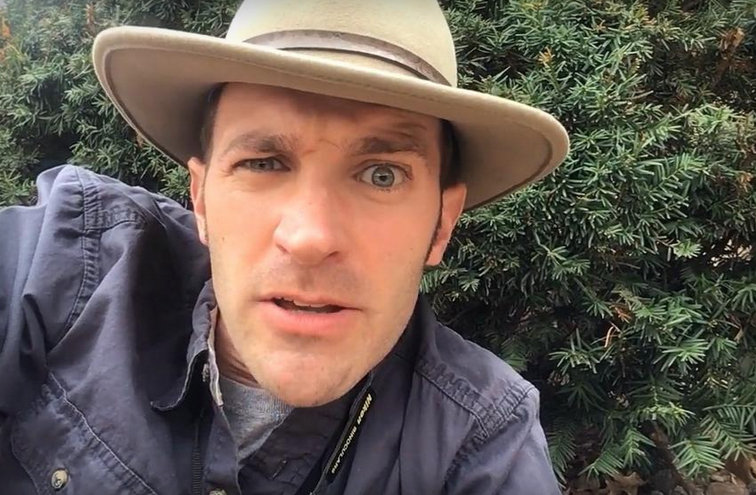
Matt Rinne has one piece of advice for classroom teachers hoping to teach computer science for the first time: Something is always better than nothing.
Rinne, a computer science teacher at Pyrtle Elementary School in Lincoln, Nebraska, believes in the value of struggling through challenges, especially for teachers approaching new topics, such as computer science.
“I think sometimes people are scared about teaching it wrong, but the struggle is the whole thing,” Rinne said. “Just having the experience of using computers is better than not.”
For about 20 to 30 hours a week, the computer science teacher adopts a Bill Nye-inspired identity to help his students learn this mindset with humor and creativity. His video series, “Coding with Carl,” takes a goofy look at some complicated computer science concepts, which Rinne says helps his students (and their parents) make learning fun. The videos have especially helped with distance learning in many Lincoln Public Schools classrooms.
LPS Computer Science Curriculum Specialist Kent Steen approached Rinne about creating the videos and said he has heard that “ ‘Coding with Carl’ is the highlight of the week for many of our K-5 students.”
Rinne grew his perspective that “something is always better than nothing” three years ago when he transitioned from teaching third grade to teaching computer science. At first, he was nervous. He knew nothing about computer science, and he wasn’t especially fond of change. But in the end, he knew the challenge would be good for him.
The grant program, called Adapt, Implement, and Research at Nebraska, gave Rinne more chances to develop his appreciation for challenging experiences. Funded by the National Science Foundation, AIR@NE examines the adaptation and implementation of a validated K-8 Computer Science curriculum in diverse school districts. Its primary goal is to study how districts facing different contextual challenges, including rural schools, majority-minority schools, and Native American reservation schools, adapt the curriculum to fit local needs and strengths to broaden participation in computer science. The grant is administered by the Center for Science, Mathematics and Computer Education, and led by principal investigator Leen-Kiat Soh of the Department of Computer Science and Engineering.
Rinne joined the first cohort of AIR@NE last summer with 28 other teachers from schools in Lincoln and the surrounding area. When Rinne felt himself getting frustrated during certain lessons that summer, he tried to put himself in his students’ shoes. Going through the struggle of learning new material helped him feel what his kids might feel when they learn new computer science topics.
“To me, it seems easy, but for them, it’s going to feel as frustrating as it was for me,” Rinne said.
His connection to other teachers in AIR@NE also has come into play with “Coding with Carl.” Fellow Cohort 1 computer science teachers Jason Rushing from Wysong Elementary School and Susan Prabulos from Meadow Lane Elementary School decide the weekly themes with Rinne and brainstorm with him about that week’s episode.
Rinne also helps his students learn through computer science programs like code.org and Scratch. However, he highlights the importance of using these fun tools to help students develop real-world computer science skills they can use in their careers.
Software changes all the time, Rinne said, and it’s important for students to learn to adapt to those changes to deepen their understanding and problem-solving skills. Even though computer science is treated as an elective course, Rinne believes the skills his students learn are almost as foundational as reading.
“Being proficient is really going to give you an edge in the workforce,” Rinne said.
He also hopes to see computer science integrated more with agricultural courses. Rinne, who grew up on a farm in Nebraska, said he sees the value that computer technology has on farming, and it’s only going to keep increasing. Since so many Nebraskans have agricultural ties, Rinne believes that computer science is something to which many students can easily relate.
Rinne said he could see himself teaching computer science for the rest of his career. As things stand, however, he assumes he’ll re-enter the world of classroom teaching soon. Regardless of what happens, he said he would love to keep teaching, so that’s exactly what he plans to do.
“I like to remember that when I was teaching third grade, I thought I’d always teach 3rd grade,” Rinne said. “Life throws you a curveball, and what I found is that I like (computer science) better. I may have to go back to the classroom for a little while, and that’s OK.”
To watch Coding with Carl Episode 1, go to: https://sites.google.com/class.lps.org/lpscompsci/april-6-9. Each week, found in the upper-right-hand corner, contains a new episode.
About the author: Alli Davis is the CSMCE communications intern and graduated in May 2020 from the UNL College of Journalism and Mass Communications.
Rinne featured by 10/11 News
Coding with Carl feature by LPS Communications
More details at: https://go.unl.edu/airne